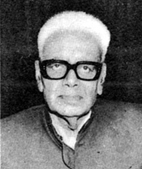Roy, Manmatha
Roy, Manmatha (1899-1988) dramatist, was born on 16 June 1899 in the village of Gala in the district of tangail. He obtained MA in Economics from the university of dhaka in 1924. After receiving the LLB degree in 1925, he started practising law at Balurghat. He was also the Mayor of the Municipality.

Manmatha Roy joined the non-cooperation movement at a very early age. His first play, Bange Musalman, composed when he was a BA student, was staged at ECD Club at Balurghat. In 1927 he wrote the mythological play Chand Saodagar, in which he portrayed the rebellious Bengali character. In Karagar (1930), he criticised the government for its treatment of Indians. As a result, the British government banned the play.
Manmatha Roy wrote several other plays inspired by the social and political conditions of the country as well as its cultural and historical background: Dharmaghat (1926), Mahuya (1929), Sabitri (1931), Ashok (1933), Mir Kasim (1938), Khana (1953), Jibantai Natak (1953), Santal Bidraha (1958), Amrta Atit (1960), and Lalan Fakir (1969). He also wrote a number of one-act plays. He delivered the Girish Ghose and DL Roy memorial lectures at Calcutta University in 1963 and 1970 respectively. He was awarded prizes by the Sangit Natak Academy (1969), State Academy of West Bengal (1971), and Calcutta University (1972). In 1967 he was awarded the Soviet Land Nehru Prize. The North Bengal University conferred an honorary DLitt upon him. He died in Kolkata 1988. [Nazmul Ahsan]
